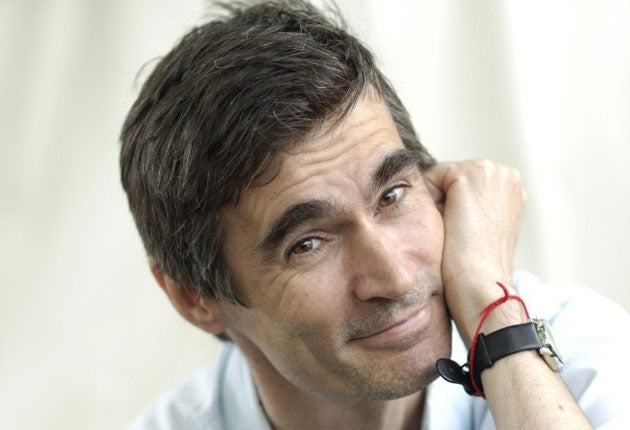Pure by Andrew Miller
Between filth and freedom in Paris

Your support helps us to tell the story
From reproductive rights to climate change to Big Tech, The Independent is on the ground when the story is developing. Whether it's investigating the financials of Elon Musk's pro-Trump PAC or producing our latest documentary, 'The A Word', which shines a light on the American women fighting for reproductive rights, we know how important it is to parse out the facts from the messaging.
At such a critical moment in US history, we need reporters on the ground. Your donation allows us to keep sending journalists to speak to both sides of the story.
The Independent is trusted by Americans across the entire political spectrum. And unlike many other quality news outlets, we choose not to lock Americans out of our reporting and analysis with paywalls. We believe quality journalism should be available to everyone, paid for by those who can afford it.
Your support makes all the difference.Andrew Miller's richly textured sixth novel opens in 1785 in a dingy ministerial anteroom in the Palace of Versaille. Jean-Baptiste Baratte, of solid Normandy stock and a recent engineering graduate of the Ecole Royale des Ponts et Chaussées, is to be interviewed for a job in Paris. While waiting he endeavours to scrape flecks of mud or shit from his stocking. A small dog fouls the floor, causing Baratte to muse on "the way even a dog's piss is subject to unalterable physical laws". This is classic Miller territory: we're back in the filth-choked, scientifically-charged 18th century (a period he spent comfortably exploring in his first two superb novels), where the inescapable earthiness of life assails on all sides and in all quarters.
Baratte is a professional who will grapple with the technical difficulties of his role but also the softer, more elusive problems: what is his place in society; and how should he pursue his own happiness? Towards the end of this novel, at a crucial moment of decision (and in previous novels Miller has put much weight on characters choosing to act), Baratte is again watching a dog heedlessly lapping water from a puddle. This simple, natural action, an instinctive quenching of thirst amid the filth of Paris streets, spurs him to take control of his life and quench his own yearning – to act, finally, according to his instinct, and in defiance of public opinion.
Murder, rape, seduction and madness impel this elegant novel. Baratte undertakes his commission of removing the entire cemetery of Les Innocents, close to the markets at les Halles. Closed after human remains broke through a wall into the cellar of a neighbouring tenement, the cemetery and its ancient church is to be cleansed. Baratte is to oversee the excavation of the graves and charnel pits (some of which, at almost 20 metres deep, draw on the engineer's mining expertise) and the transport of bones to a defunct quarry outside the city.
Purifying centuries of decaying mortality and removing the miasma that permeates the dwellings, skin and even food of the area is neither simple nor necessarily popular. Miller threads into this fabric subtle ideas about modernity, glancing at Voltaire, public health and the seditious graffiti that anticipate the revolutionary fervour of 1789 - just four years away.
Within this physical and political decay, Miller couches the heart of the matter: how to live one's life with personal integrity, with a purity not so much morally unblemished as unalloyed with the fads and opinions of society. This concern has driven most of Miller's protagonists. In One Morning Like a Bird, a novel beautifully nuanced with atmospheric detail, feeble young intellectual Yuji Takano has to negotiate a mode of living in wartime Tokyo in the face of hostility to his pacifism. The old roué in Miller's superb Casanova seeks bliss philandering in London but achieves only a hollow satiety. At the novel's close, a man yells "I am happy!" from a window. Is he insane? Casanova wonders, then mutters: "Would that it were contagious".
Such contagion Miller gently encourages through his procession of energetic, acutely observed characters, such as Père Colbert, the cemetery's mad priest; Heloïse, a demurely self-possessed whore; or Armand, the church's flamboyant organist. Miller populates Baratte's quest for equanimity with these lush and tart characters, seductively fleshed out, who collectively help to deliver the bittersweet resolution of Baratte's professional and personal travails.
Join our commenting forum
Join thought-provoking conversations, follow other Independent readers and see their replies
Comments